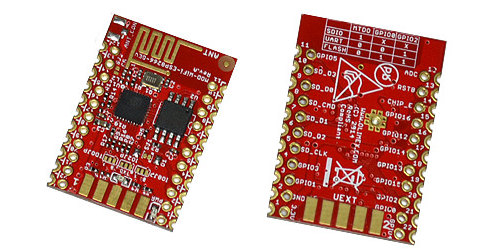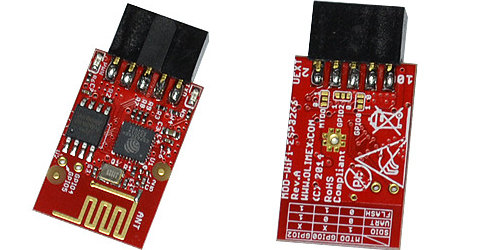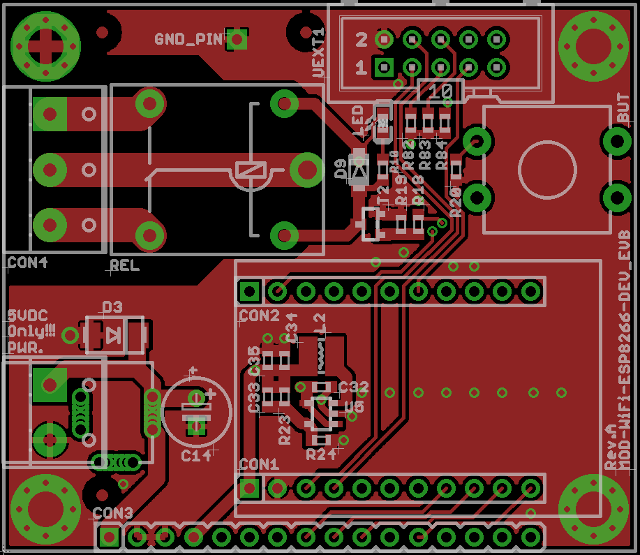ESP8266 has become popular as module based on this SoC make it incredibly cheap to add Wi-Fi to all sort of things, the SDK available, and a community has gathered around the solution. Olimex has jumped on the bandwagon, and is now provided two open source hardware ESP8266 modules: MOD-WIFI-ESP8266 which makes it easy to interface to other Olimex boards thanks to its UEXT connector, and MOD-WIFI-ESP8266-DEV with two rows of 0.1″ connectors and an unsoldered UEXT pad, is better suited if you want to integrate it with your own baseboard, or experiment with a breadboard. An evaluation board called MOD-WIFI-ESP8266-EVB will be launched a little later.

Both modules share most specifications:
- SoC – Espressif Systems ESP8266 32-bit RISC processor with 802.11 b/g/n support(32-pin QFN package),
- Wi-Fi – 802.112 b/g/n with WEP, TKIP, AES, and WAPI engines, Wi-Fi direct (P2P), and soft-AP. On-board antenna and u.FL connector
- Expansion
- MOD-WIFI-ESP8266 – UEXT connector for Olimex MCU boards
- MOD-WIFI-ESP8266-DEV – 2x 11-pin connectors (0.1″ pitch) for 11 GPIOs, ADC, SDIO, and power signals, and 10 solder pads for an unsoldered UEXT connector (I2C and UART, 3.3V and GND).
- Dimensions – N/A
- Weight – N/A

The upcoming MOD-WIFI-ESP8266-EVB evaluation board will feature a relay, buttons, a power supply, and GPIOs header. Availability is schedule in a few weeks.

[Update: Features for MOD-WIFI-ESP8266-EVB:
- MOD-WIFI-ESP8266-DEV module with soldered connectors
- Base board with female connectors for accepting MOD-WIFI-ESP8266-DEV
- Power Relay 10A/250VAC connected with driver to GPIO output
- User Button connected to GPIO input
- Power supply jack – 5V input
- DCDC power converter to 3.3V to supply ESP8266 and UEXT modules with up to 1.5A current
- UEXT connector where you can connect different modules and sensors from Olimex
- GPIO CON3 with 16 pins where all ESP8266 resources are available
- 4 mounting holes
]
You can find the schematics and PCB layout (Eagle and PDF) on MOD-WIFI-ESP8266 and MOD-WIFI-ESP8266-DEV product pages, and the two modules sell for respectively 5 and 5.50 Euros + shipping, and as low as 4 Euros in quantities greater than 50 pieces. Price for MOD-WIFI-ESP8266-EVB (including MOD-WIFI-ESP8266-DEV) will be 12 Euros.

Jean-Luc started CNX Software in 2010 as a part-time endeavor, before quitting his job as a software engineering manager, and starting to write daily news, and reviews full time later in 2011.
Support CNX Software! Donate via cryptocurrencies, become a Patron on Patreon, or purchase goods on Amazon or Aliexpress





Does this work with both Raspberry Pi and Arduino?
@Harley
It’s controlled via SPI or UART, so in theory it could be hooked to a Raspberry Pi or Arduino board. But if you just want to add Wi-Fi to a Linux board, a USB dongle will be better, because it’s even cheaper, and will be more faster. ESP8266 is more suited to MCU based system that don’t have the required memory for a full TCP/IP stack. ESP8266 modules can also be used in standalone mode.
@cnxsoft
Apparently you can run Lua scripts on this module that behave very much like Node.js. Have a look here for more info.
You can get the ESP-12 version of the ESP8266 (with something like 16/14 GPIOS) for around $3 US on AliExpress. This might be somewhat expensive to compete…..especially when one factors in the shipping cost.
@halherta
Your link is empty, maybe it was that one: https://scargill.wordpress.com/2014/12/01/esp8266-lua-editing-tool/ ?
The Olimex site incorrectly says they have an ARM processor core inside. It is in fact an Xtensa LX106 core from Tensilica.
Or the one made by limpkin is actually currently available (even if it’s more expensive):
http://www.limpkin.fr/index.php?post/2014/11/27/A-Development-Board-for-the-ESP8266-03
Yikes, shipping from Europe to Australia is not cheap. I’ve ordered five so that I’m paying more for the product than postage. Lets hope they’re not too hard to program…
@cnxsoft
@cnxsoft, oops sorry that is it…. the nodemcu github repo also has some great tuts https://github.com/nodemcu/nodemcu-firmware and https://github.com/nodemcu/nodemcu-firmware/wiki/nodemcu_api_en
Updated post with more details about the evaluation board, and its price.
MicroPython also started ESP8266 port. Unlike awful chinese lua mess quoted above, it’s fully open-source project: https://github.com/micropython/micropython/tree/master/esp8266
CNX, btw, will you have your traditional crowdfuning round-up this year? Please include MicroPython in your review – it’s not only one of the successfully projects delivered on time, it continues to be developed and is rumping up.